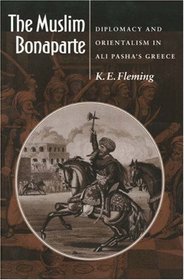Search -
The Muslim Bonaparte: Diplomacy and Orientalism in Ali Pasha's Greece
The Muslim Bonaparte Diplomacy and Orientalism in Ali Pasha's Greece
Author:
Ali Pasha of Ioannina (?1750-1822), the Ottoman-appointed governor of the northern mainland of Greece, was a towering figure in Ottoman, Greek, and European history. Based on an array of literatures, paintings, and musical scores, this is the first English-language critical biography about him in recent decades. K. E. Fleming shows that the Brit... more »
Author:
Ali Pasha of Ioannina (?1750-1822), the Ottoman-appointed governor of the northern mainland of Greece, was a towering figure in Ottoman, Greek, and European history. Based on an array of literatures, paintings, and musical scores, this is the first English-language critical biography about him in recent decades. K. E. Fleming shows that the Brit... more »
ISBN-13: 9780691001944
ISBN-10: 0691001944
Publication Date: 3/8/1999
Pages: 216
Rating: ?
ISBN-10: 0691001944
Publication Date: 3/8/1999
Pages: 216
Rating: ?
0 stars, based on 0 rating
Publisher: Princeton University Press
Book Type: Hardcover
Other Versions: Paperback
Members Wishing: 0
Reviews: Amazon | Write a Review
Book Type: Hardcover
Other Versions: Paperback
Members Wishing: 0
Reviews: Amazon | Write a Review
Genres:
- Biographies & Memoirs >> General
- Biographies & Memoirs >> Historical >> Europe >> Greece
- History >> Europe >> Albania
- History >> Europe >> Greece >> General




